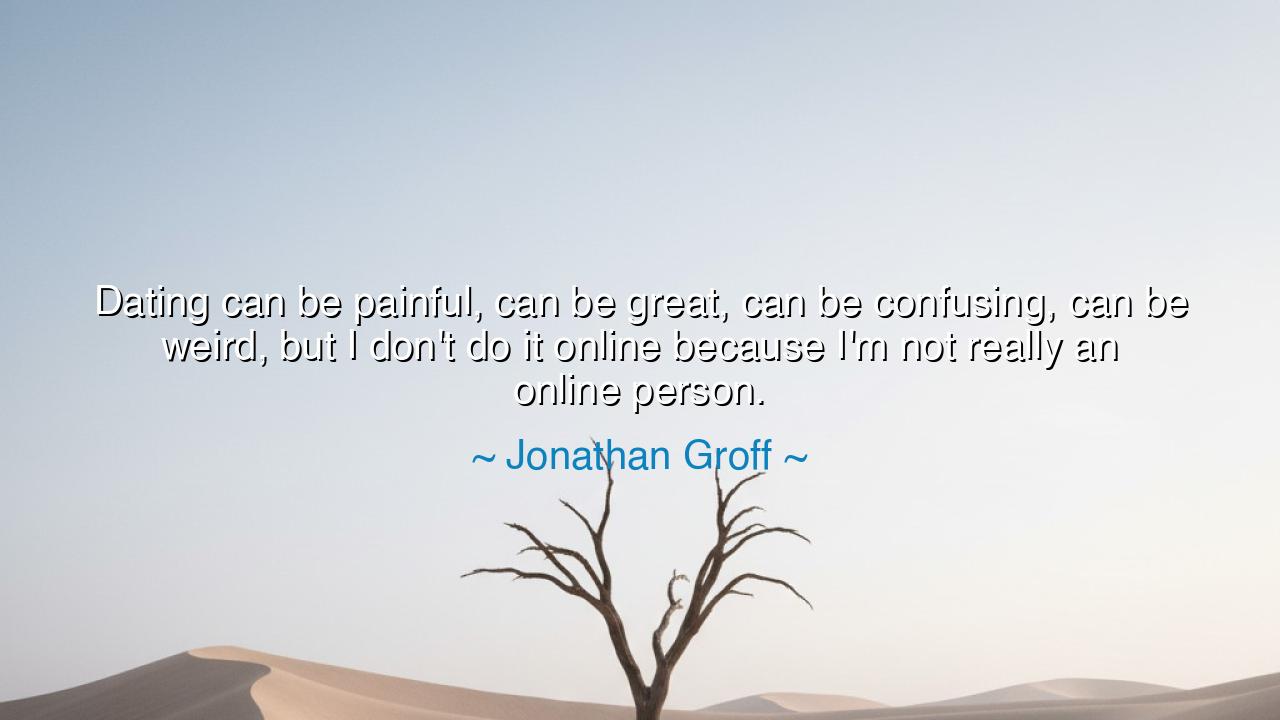
Dating can be painful, can be great, can be confusing, can be
Dating can be painful, can be great, can be confusing, can be weird, but I don't do it online because I'm not really an online person.






In the marketplace of the heart, Jonathan Groff speaks plainly: “Dating** can be painful, can be great, can be confusing, can be weird, but I don’t do it online because I’m not really an online person.”** Hear how his words move like a fourfold wind—one gust stings, one heals, one swirls like dust, one blows from unfamiliar coasts—and then he plants his staff, choosing the footpath over the paved road of screens. He does not deny the mixed weather of love; he simply declares the kind of sky under which he will travel. This is not a judgment upon others; it is a vow to keep the terrain of his affections close to breath, voice, and presence.
The ancients knew these seasons. They spoke of eros as both honey and knife, of meetings that brighten the eye and partings that salt the earth. To say that dating can be great is to honor the feast day of discovery; to say it can be painful is to remember that every feast leaves dishes to wash. In calling it confusing and weird, Groff does not mock the path; he admits that the heart’s compass sometimes spins. Yet his final turn—“I don’t do it online”—is a choice of ritual: he prefers the pressure of a handshake to the weightless tap, the cadence of laughter in the air to the silent glow of a message. He seeks a flame that warms the face, not only a light that illumines a glass.
Consider a small story from our time. A teacher, long faithful to the chalk-dusted sanctum of her classroom, tries a row of online profiles after many quiet winters. She gathers “likes” as fishers gather moonlight—bright, plentiful, not edible. Conversations begin like fireworks and fall like ash. One evening she meets a friend-of-a-friend at a bookshop—no filters, no avatars, only the clumsy grace of two people reaching for the same spine of poetry. They walk, speak, misstep, laugh; a week becomes a month, a month becomes a slow, honest courtship. She deletes nothing in anger, only in understanding. For her, as for Groff, the body’s proximity proved the truer instrument for tuning desire.
Let our minds travel further back, to Héloïse and Abélard. Their love was carried not by instant transmissions but by letters that crossed distances like pilgrim-ships. The waiting hurt—painful indeed—but the words arrived bearing breath and thought, the weight of ink, the patience of wax seals. No one calls their devotion efficient, nor would we desire it so. The shape of their ritual—however fraught—taught them endurance, reverence, and the cost of saying “yes” with one’s whole life. Rituals of approach, chosen with care, often shape the quality of love that follows.
Groff’s confession—“I’m not really an online person”—is not a boast; it is a boundary. Boundaries are the walls that make a hearth possible. Without them, warmth dissipates into the indifferent night. He names the gate through which love may enter his house: conversation uncompressed, glances unpixelated, the courage to be awkward in person. This is a discipline, like learning the lyre or tending olives: slow, sometimes confusing, occasionally weird, often great. It insists that the soul show up in the flesh and risk the tremor in the hand.
What, then, is the wisdom for us? First, honor temperament. If you are not really an online person, do not betray your nature for convenience; if you are, do not mistake convenience for fate. Second, recognize the many faces of dating and keep faith with them all: when joy comes, give thanks; when painful lessons arrive, harvest their grain; when confusing fog descends, walk slowly; when weird surprises startle, bow and learn. Third, choose a ritual of meeting that magnifies your courage rather than your fear. The channel you select is the first note of the song you will sing together.
Practical actions follow like steps on a colonnade. Craft your “first-meet” practice: invite a friend to host small, hospitable gatherings; favor places where conversation can breathe—bookshops, gardens, markets, quiet cafés. Limit online seeking, or use it only as a gate to swift, embodied encounters—no endless scroll, no museum of masks. Prepare a few questions that test for wonder: “What work makes you lose time?” “What beauty have you sought this month?” Keep the meetings short at first; leave while the candle still has wax. End each encounter with a deliberate act—walking them to the door, writing a note—so that the soul knows something real has occurred.
Finally, take from Groff’s words a bright and steady law: let your method match your meaning. If you desire love that listens, arrange to hear real breathing. If you want loyalty, practice consistency in showing up. If you hope for a joy that is great, accept the possibility of endings that are painful; if you can tolerate moments that are weird and stretches that are confusing, you will find, amid the tangle, the clean thread that leads you home. And when asked why you walk this way, you may answer with quiet confidence: “I do not do it online; I seek the living face.”






AAdministratorAdministrator
Welcome, honored guests. Please leave a comment, we will respond soon